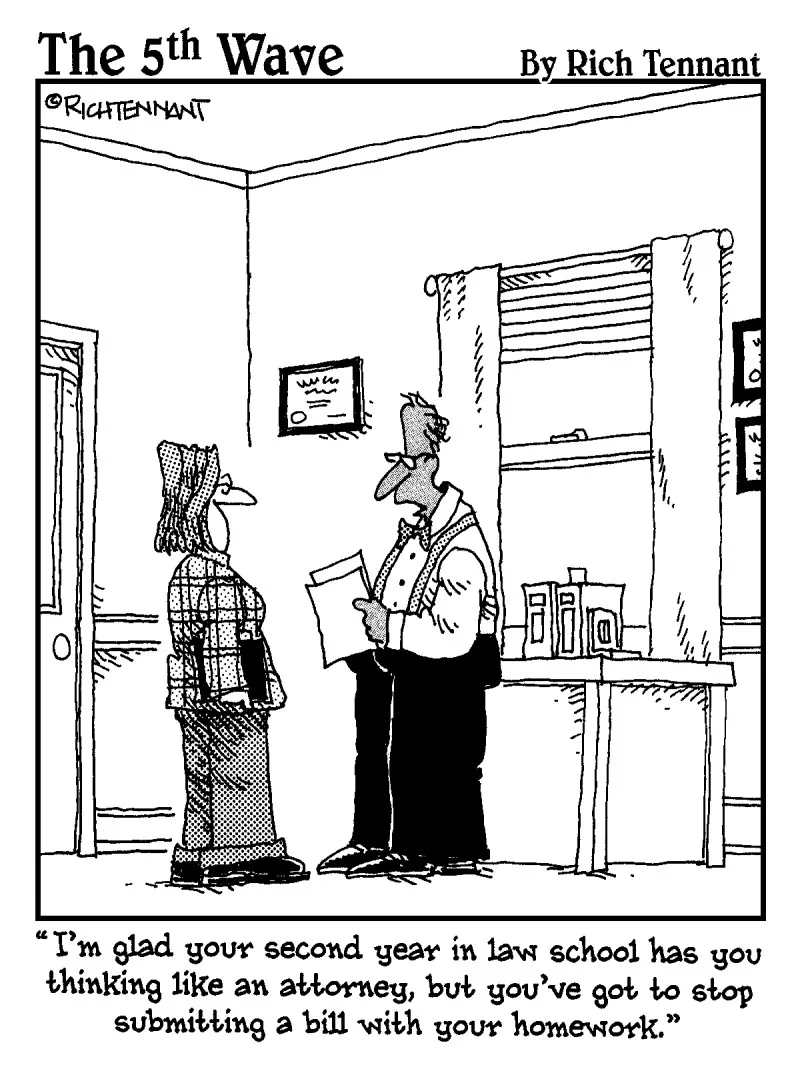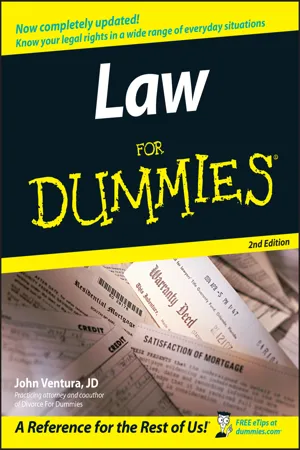eBook - ePub
Law For Dummies
About this book
Get answers to your legal questions — in plain English!
Find out how to protect your family, your money, your job, and your rights
If you're like most people, you probably don't know much about your legal rights and responsibilities — until you run smack-dab into a messy legal problem. Now revised and updated, this friendly guide helps you get a handle on a wide range of everyday legal issues, decipher legal mumbo-jumbo — and come out on top.
Discover how to:
- Protect your child support rights
- Arm yourself against identity theft
- Clean up your credit and improve your credit score
- Hire the right attorney for your needs
- Draw up wills and living wills
Tools to learn more effectively

Saving Books

Keyword Search

Annotating Text

Listen to it instead
Information
Part I
Basic Legal Stuff

In this part . . .
It’s difficult to understand the law if you don’t first know how this country’s legal system works. The first chapter in this section discusses the court system, civil trials, and contracts. The next chapter presents ways that you can solve basic legal problems without the help of an attorney, and I wrap up this part by helping you discern when you need an attorney and how to find the right one for you.
Chapter 1
All About Our Legal System
In This Chapter





What do you think of when you hear the words legal system? If you’re like many Americans, you probably think of a courtroom where lawyers, using language you can’t understand, argue with one another, and where a jury of people you don’t know, or a judge in a black robe behind an imposingly high desk, makes decisions about your life using laws you know little or nothing about. That’s an intimidating image, but it’s only a very small part of the picture! Our legal system is much more than just courtroom action.
This chapter expands your definition of what our legal system is by providing you with information you probably never got in high school — or don’t remember learning, anyway. Maybe you slept through class the day these things were covered! With a more complete understanding of our legal system, you’re better able to avoid getting into legal hot water, and you feel more confident about exercising your legal rights when you do.
And now for your remedial crash course on our legal system. . . .
What Are Laws and Where Do They Come From?
Our laws reflect society’s standards, values, and expectations. They establish “the rules of the game” in our personal interactions and in our business dealings, helping to ensure that we’re treated fairly and that we treat others fairly, too. Laws establish our responsibilities and our rights and help us both avoid problems and resolve problems.
The laws that govern our lives come from six basic sources: the U.S. Constitution, the Bill of Rights, statute law, administrative law, common law, and case law.
The Constitution
The Constitution is the granddaddy of all U.S. law, the supreme law of the land, and the standard against which all other laws are measured. It established this country as a republic and determined the structure of our Congressional system. The Constitution applies to all Americans.
The Constitution is a “living” document because our lawmakers can amend it to respond to changes in our country’s needs, concerns, and values. Presently, the Constitution consists of 7 articles, 10 amendments that make up the Bill of Rights, and 17 other amendments that have been adopted over the years.
The Bill of Rights
The Bill of Rights defines the fundamental rights of all Americans. It places limits on how much control the federal government can exercise over our lives by guaranteeing certain freedoms, which include the following:






State law
In addition to the U.S. Constitution, each of the 50 states has its own constitution, which provides the basis for the states’ own laws. States can make their own laws as long as those laws don’t conflict with federal laws and don’t violate the tenets of the U.S. Constitution. In fact, state laws frequently expand or enhance federal laws. For example, the federal Fair Credit Reporting Act says that consumers have the right to receive a free copy of their credit report if they apply for credit, employment, or insurance and are denied it due to information in their report. Some states have passed their own laws related to credit bureaus; such laws specify that consumers are entitled to a free copy of their credit report every year, whether or not they’re turned down for credit, insurance, or employment.

Statute law
Another basic kind of law is statute law — laws adopted by the U.S. Congress and by state and local elected officials. These laws most affect our daily lives, which is why we really should be familiar with them. They apply to such things as our credit rights, our rights when we’re contacted by a debt collector, the right to leave our property to others, our rights and responsibilities as married couples or parents, the rules of the road, and so on. Many of these laws are covered in this book.
Administrative law
Administrative law is perhaps better described as rules and regulations created and enforced by regulatory agencies. For example, the Internal Revenue Service has the power to tell us what we can and can’t deduct on our tax returns and can fine us when we violate its rules; the Federal Trade Commission can establish rules governing what telemarketers and debt collectors can and can’t do when they contact us, and it can take legal action against businesses that ignore its rules; and the Environmental Protection Agency has the power to control the kinds and levels of emissions that businesses may release into the environment and to impose penalties and other sanctions on companies t...
Table of contents
- Title
- Contents
- Introduction
- Part I : Basic Legal Stuff
- Chapter 1: All About Our Legal System
- Chapter 2: Do It Yourself: Solving Your Own Legal Problems
- Chapter 3: Solving Legal Problems with an Attorney
- Part II : Laws That Affect Your Daily Life
- Chapter 4: Relationships, Marriage, and Divorce
- Chapter 5: Parenting and Child Care
- Chapter 6: The Law and Your Job
- Chapter 7: Driving and the Law
- Chapter 8: Privacy: Do You Really Have Any?
- Part III : The Law and Your Money
- Chapter 9: So You Want to Be an Entrepreneur!
- Chapter 10: Credit: Getting It, Using It, Losing It, Rebuilding It
- Chapter 11: Smart Spending
- Chapter 12: Buying and Selling a Home
- Part IV : Tough Stuff: Being Sick, Getting Older, Dying
- Chapter 13: Your Health Care Rights
- Chapter 14: Getting Older: We All Do It
- Chapter 15: Estate Planning
- Chapter 16: Death and Dying: Doing It Gracefully
- Part V : Crime and Punishment
- Chapter 17: Do the Crime, Do the Time
- Chapter 18: Juvenile Law: The Times Are Changing
- Part VI : The Part of Tens
- Chapter 19: More Than Ten Ways to Avoid Legal Problems
- Chapter 20: Ten Common Mistakes Consumers Make When Hiring an Attorney
Frequently asked questions
Yes, you can cancel anytime from the Subscription tab in your account settings on the Perlego website. Your subscription will stay active until the end of your current billing period. Learn how to cancel your subscription
No, books cannot be downloaded as external files, such as PDFs, for use outside of Perlego. However, you can download books within the Perlego app for offline reading on mobile or tablet. Learn how to download books offline
Perlego offers two plans: Essential and Complete
- Essential is ideal for learners and professionals who enjoy exploring a wide range of subjects. Access the Essential Library with 800,000+ trusted titles and best-sellers across business, personal growth, and the humanities. Includes unlimited reading time and Standard Read Aloud voice.
- Complete: Perfect for advanced learners and researchers needing full, unrestricted access. Unlock 1.4M+ books across hundreds of subjects, including academic and specialized titles. The Complete Plan also includes advanced features like Premium Read Aloud and Research Assistant.
We are an online textbook subscription service, where you can get access to an entire online library for less than the price of a single book per month. With over 1 million books across 990+ topics, we’ve got you covered! Learn about our mission
Look out for the read-aloud symbol on your next book to see if you can listen to it. The read-aloud tool reads text aloud for you, highlighting the text as it is being read. You can pause it, speed it up and slow it down. Learn more about Read Aloud
Yes! You can use the Perlego app on both iOS and Android devices to read anytime, anywhere — even offline. Perfect for commutes or when you’re on the go.
Please note we cannot support devices running on iOS 13 and Android 7 or earlier. Learn more about using the app
Please note we cannot support devices running on iOS 13 and Android 7 or earlier. Learn more about using the app
Yes, you can access Law For Dummies by John Ventura in PDF and/or ePUB format, as well as other popular books in Law & Law Theory & Practice. We have over one million books available in our catalogue for you to explore.
